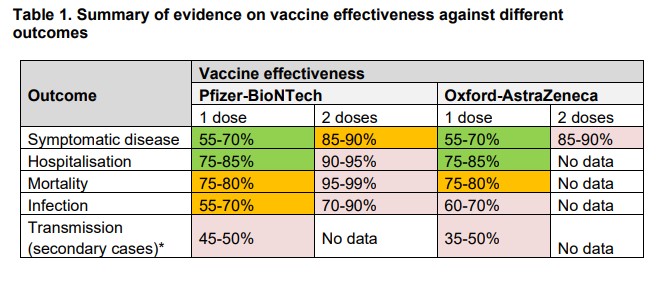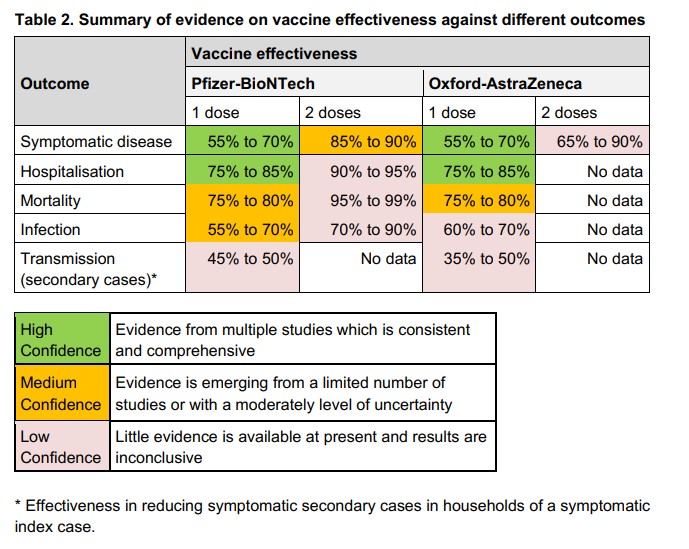The latest Public Health England (PHE) weekly vaccine surveillance report appeared on Thursday (another one is due tomorrow).
I wasn’t holding out high hopes for this instalment, after digging down into the method used the previous week and finding it didn’t control adequately for background incidence (so confounded vaccine effectiveness with natural decline) and applied such brutal adjustments it could turn a 4% effectiveness into a 73% one. It lived down to expectations.
The authors appear still to be working out what exactly their reports are for as each of the three to date presents different information in a slightly different way. While the first was largely a summary of evidence published elsewhere, the second served more as a showcase for PHE’s latest study and focused on effectiveness against symptomatic disease in the over-65s (90%, supposedly). This week, the over-65s are gone and the focus is on effectiveness against the Indian variant. This makes reading the reports quite confusing, as each doesn’t feel so much like an update to the previous one as a stand-alone report on a separate topic.
In between Report 2 (for week 20) and Report 3, a separate PHE study was published on the Indian Delta variant which found the effectiveness of full vaccination against symptomatic Covid reduced from 93% to 88% with Pfizer and 66% to 60% with AstraZeneca when the Indian Delta variant was involved versus the British Alpha variant.
As I noted last week, this 66% effectiveness of AstraZeneca (against the British Alpha variant) was a long way below the 90% in the over-65s claimed in Report 2. It’s probably a sign of how low my opinion is of PHE vaccine studies that I was pleasantly surprised to see this discrepancy actually make an impact on the data presented in Report 3, and you can see below in the AstraZeneca two-doses box (top right) week 20’s “85-90%” has become “65% to 90%” in week 21. There is still no explanation from PHE, however, as to why one of their studies finds AstraZeneca 90% effective against symptomatic infection in the over-65s while another finds it is just 66% effective in all ages. Is this not the kind of discrepancy that should occasion comment from the authors?


Another moment where full transparency seems to be lacking is in the section about the Indian Delta variant, where rather than presenting the figures for each vaccine separately the authors combine the data for the two vaccines to give 81% overall effectiveness against the new variant.

This seems a strange decision given that this breaks down to 88% for Pfizer and 60% for AstraZeneca, making Pfizer almost 50% more effective than AstraZeneca against the Indian Delta variant. Was this done to spare AstraZeneca’s blushes? Certainly there’s no sign of PHE drawing attention to this disappointing AZ data. We might wonder though: is part of what is driving the recent fear-mongering from SAGE scientists a worry that the Oxford “workhorse” vaccine is not up to the job, particularly in the most vulnerable?
Another oddity is that the report states that “by May 23rd 2021, the overall vaccine uptake in England for dose 1 was 51.3% and 31.4% for dose 2”. Yet the Government dashboard shows 72% of the adult population had one dose and 42% had two doses by that date. The reason? The report is counting children in the unvaccinated population, but without noting this fact.
Overall my feeling is that these reports have been of limited usefulness (so far), and manage to confuse as often as they clarify. What we really need from PHE are studies which control properly for background incidence so we can get a proper picture of how effective the vaccines actually are, including in the frail elderly where many of the deaths are concentrated. We are also waiting for a proper analysis of the post-vaccination infection spike, rather than half-baked attempts to explain it away, and are long overdue studies that include analysis of safety and not just efficacy. Will PHE step up to the plate?












To join in with the discussion please make a donation to The Daily Sceptic.
Profanity and abuse will be removed and may lead to a permanent ban.
I’m looking forward to the follow up, The Prime Minister and the Entire Cabinet Impaled on Spikes on Westminster Bridge – The Musical
When do the tickets go on sale?
Just as soon as I’ve finished sharpening these wooden sticks
How about Kim Jong Johnson vs Frank Bruno?
A co-(vid)production with Andrew Lloyd Whassisname? Lyrics by Tim Starchysubstance.
Maybe a tadge off topic, but I had the most amusing, and also the most telling, exchange with the owner of a pub about a scotch egg. Trying to get a pint without ordering a three course meal (back in the day when Covid could only attack you if you hadn’t ordered food) I tried to defuse the situation by mentioning that perhaps I could have a nice scotch egg with my pint. The landlady then went on a full five minute tirade about how a scotch egg was definitely not a ‘substantial meal’. I actually learnt a lot about people from that one 5 minute exchange. More than I had in my previous 49 years. That actually set me up for the rest of the irrational nonsense that followed. The power of a scotch egg!
Propaganda works. Acceptance is much easier than thinking.
Good theatre/cinema is very effective propaganda. Bravo to all those involved; and let there be more of it.
P.S. I do like the sound of your musical. Were you thinking of a sort of Life of Brian crucifixion scene, or did you have something like Les Mis in mind? I rather fancy a new version, called The Miserables. It would start with misery and end with a sort of V for Vendetta triumph.
Also a tad OT, but I watched Have I got a Bit More News for You last night. This was the extended version of the most recent episode, so current then. Not historic.
All the participants were STILL sitting in between perspex screens. I thought Covid had been declared to be over.
Does BBC wish it wasn’t? Is it still trying to perpetuate the fear among its audience members?
I was in Durham yesterday, they have a lot of chinks at the uni there. 90% of them at least were wandering around in face nappies. This was not happening before the pandemic.
And they complain when we comment that they all look alike!
Many Asian I suspect!
Plenty of small theatres in Scotland that need some trade, and a populace that needs a kick up their fundament. Hopefully the Scotch egg will travel that far….
One hopes that the witty lyrics are more discernible than those that I hear in BBC radio shows that include ‘comic songs’. These are invariably performed by those whose talents don’t include a good voice or clear enunciation, which makes the whole enterprise rather pointless.
Please let us know when future performances are taking place!